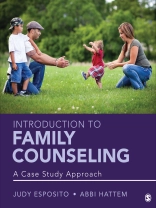‘Engaging, Creative, and Practical’
– Lakitta D. Johnson,
Jackson State University
Introduction to Family Counseling: A Case Study Approach presents basic knowledge about family counseling and applies various theoretical models to a case example looking at one nuclear family, along with its extended family members, that readers follow throughout the text. Judy Esposito and Abbi Hattem’s multi-generational family is constructed from their experiences as professors and family therapists to exemplify the concepts and theories of family counseling. Beyond the theories of family counseling, students learn about the family life cycle and various tools for assessing families as well as the history of family counseling. Ethical issues relevant to family counseling are also included along with transcripts from hypothetical family counseling sessions throughout the book. In addition, the book focuses on working with diverse families and takes special care to emphasize multicultural issues.
Daftar Isi
Part I: Introduction to the Family
Chapter 1: The Manning-Kelly Family
Cast List
Genogram
Presenting Problem
History of the Presenting Problem
Social Support
Clinical Observations and Impressions
Preliminary Assessment
Theoretical Conceptualization
Conclusion
Chapter 2: Families and the Family Life Cycle
The Family Life Cycle
Conclusion
Chapter 3: Assessing Families Traditionally and Creatively
Traditional Assessment Methods
Lifestyle Questionnaire
Family Sculpting
Christina′s Family Sculpture
Family Scripting
Family Play Therapy
Family Puppet Shows
Family Build-A-House
Family Aquarium
Family Play Genograms
Conclusion
Part II: Theories of Family Counseling
Chapter 4: The Family Systems Approach to Family Counseling
Origins of Family Counseling
Family Systems and Family Dynamics
Family Subsystems
Circular Causation and Feedback Loops
Homeostasis and Equilibrium
Family Rules
First and Second Order Change
Second Order Cybernetics
Function of the Presenting Problem in the Family
Family Resiliency
Systemic Assessment of the Manning-Kelly Family
Conclusions
Chapter 5: Multi-Generational Family Counseling
Emotional Fusion and Differentiation of Self
Triangles
Nuclear Family Emotional Process
Family Projection Process
Cut-Offs
Multigenerational Transmissions
Family Roles
Sibling Position
Societal Emotional Process
Genograms
Conclusions
Chapter 6: Structural Family Counseling
Structural Family Counseling Concepts
Structural Family Counseling
Using Structural Family Counseling with the Manning-Kelly Family
Summary and Conclusions
Chapter 7: Experiential Family Counseling
What is Experiential Counseling?
Experiencing the Emotional Layer of the Family
The Family System
Experiential Counseling Interventions
Virginia Satir′s Family Growth Model
Using Experiential Counseling with the Manning-Kelly Family
Conclusions
Chapter 8: Other Approaches to Family Counseling
Introduction
Adlerian Family Counseling
Cognitive Behavioral Therapy
Post-Modern
Integrative Family Counseling
Conclusion
Part III: Other Aspects of Family Counseling
Chapter 9: Special Topics in Family Counseling
Multicultural Families
LGBTQIA Families
Single-Parent Families
Blended Families
Families with Aging Members
Families with Biomedical Conditions
Families Coping with Mental Health and Substance Abuse Disorders
Domestic Violence
Conclusions
Chapter 10: The Counselor′s Experience Working with Families
The Power of Family Systems
How Families Induce Family Counselors
Managing Multiple Relationships
Comfort with Diversity
Experiencing the Family
Experiencing the Manning-Kelly and Jones Family
Self-Awareness, Self-Care, & Ethical Practice [+plan, bal own fam]
The School Counselor′s Experience
Conclusions
Chapter 11: Ethics of Family Counseling
Introduction
Protecting Clients
Reporting Laws
Law and Ethics
Referrals
Self-Care
Scope of Practice
Ethical Decision-Making Model
Conclusions
Part IV: Current Trends in Family Counseling
Chapter 12: Family Issues Requiring Services Beyond Counseling
Cultural Competence Working with Multicultural Families
LGBTQIA
Single-Parent Families
Blended Families
Families with Aging Members
Families with Biomedical Conditions
Families Coping with Mental Illness and Substance Abuse Disorders
Domestic Violence
Conclusion
Chapter 13: Services Available to Families
Social Services
School Counselors and School Social Workers
In-Home Services
Juvenile Justice and Delinquency Prevention
Respite Care in Group Homes
Wilderness Therapy Programs and Camps
Employee Assistance Programs
Support for Military Families
Faith-Based Support Programs
Non-Profit Agencies
Referral Process
Chapter 14: What′s Next for the Manning-Kelly Family?
Introduction
Family Counseling
What′s Next for the Manning-Kelly and Jones Family?
What′s Next for the Individual Family Members?
Family Secrets
Termination
What′s Next for You as a Family Counselor?
Conclusion
Tentang Penulis
Abbi Hattem, Ph.D. is an individual, marriage, and family therapist in private practice in Chapel Hill NC. She specializes in the mental health sequelae of acute and chronic trauma and of chronic illnesses, including eating and dissociative disorders, for individuals and their families.She has been an adjunct faculty member at California State University at Northridge, the University of Southern California, and most recently Elon University. She has been on the faculties at Texas Tech University and the University of North Carolina at Chapel Hill School of Medicine. She has two grown sons and lives in Chapel Hill NC with her fiance Bruce and their dog Trotsky and three cats Rumpelteazer, Ashrei, and Sugar Rei.












